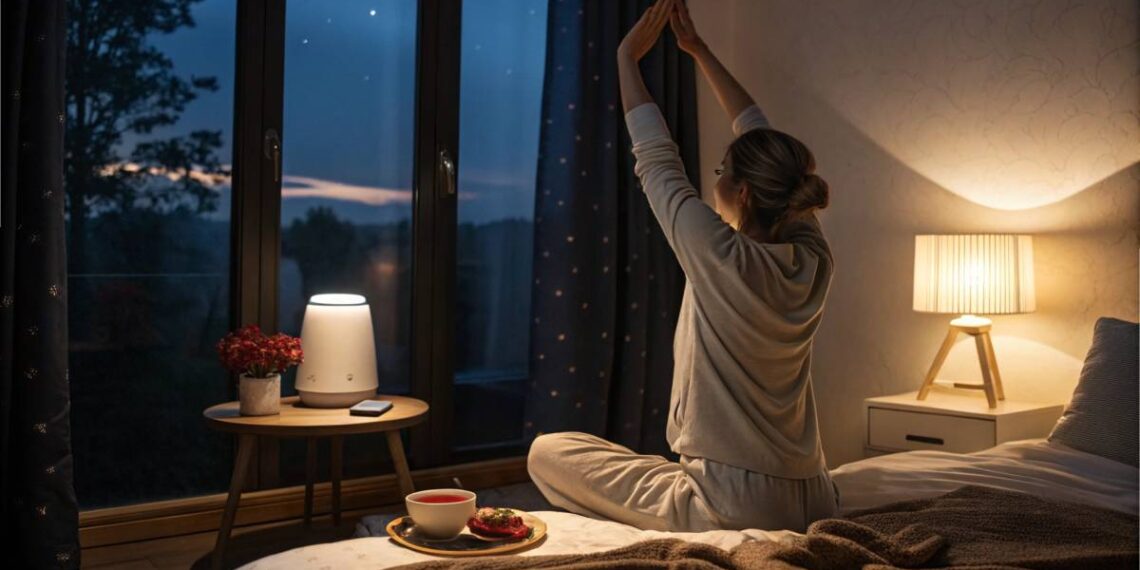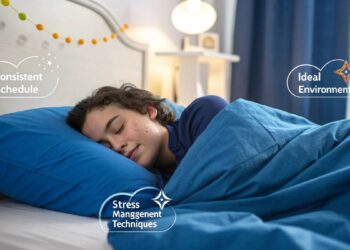Struggling to achieve a good night’s sleep despite your best efforts? You’re not alone. Many individuals grapple with sleep disturbances and anxiety that disrupt their nightly rest. However, the solution might be simpler than you think—often lying in the lifestyle choices you make daily. By making targeted adjustments to your habits, bedtime routine, and sleep environment, you can significantly improve your sleep quality and overall well-being. This guide delves into practical lifestyle changes that can help you transition from restless nights to peaceful, rejuvenating sleep. Let’s explore how tweaking your daily routines and surroundings can pave the way for better sleep and reduced anxiety.
Main Key Takeaways
- Sleep-Boosting Foods: Incorporate specific foods that promote quicker and deeper sleep.
- Establishing a Relaxing Bedtime Routine: Create consistent habits that signal your body it’s time to wind down.
- Creating a Sleep-Conducive Environment: Optimize your bedroom to enhance sleep quality.
- Pairing Yoga with Sleep Hygiene: Combine yoga with other practices for maximum sleep benefits.
- Lifestyle Adjustments for Reduced Anxiety: Tweak daily habits to minimize stress and promote relaxation.
Stress and Sleep Relationship
Understanding the Relationship Between Stress and Sleep
Stress and sleep are like two dance partners, where one constantly steps on the other’s toes. Imagine this—you’re stressed. Your brain throws a party with cortisol (the no-chill hormone), which crashes your sleep plans. Meanwhile, skimping on sleep invites stress to move in, leading to a merry-go-round where stress and lack of sleep keep giving each other high-fives.
Stress flips the switch for your body’s “uh-oh” button, speeding up your heart, and pumping blood pressure, ruining your sleep vibes. Looking into natural sleep tips may help break this nonstop cycle. If you’re curious about how stress sneaks into your sleep, dive into relaxation moves and chill thoughts.
Impact of Stress on Sleep Quality
Stress doesn’t just mess with your head; it throws wrenches into your bedtime. We’re talking about tossing and turning while staring at the ceiling, constantly waking up, and never feeling refreshed. When stress sticks around, it can cement itself into chronic bad sleep, only turning up the stress notch louder.
| Stress Mess | Sleep Takes a Hit |
|---|---|
| Can’t Sleep? | Yep, that’s up there |
| Wake-Up Calls at 2 AM | Quite a bit |
| Tossing and Turning | You bet |
| Dreams Gone Dark | Not so much |
| No Chill in REM | Sometimes |
A brain revved-up on stress is stuck in overdrive with jittery thoughts, stealing that deep, dream-world sleep. This means yawning through your day, being snappy, and failing to juggle everyday hurdles.
Getting on the path to better sleep in stress-world could mean trying out mind tricks and chill time just before bed. Plus, designing a sleep-nest worthy of snooze royalty—your own chill bedroom sanctuary—can make the night’s rest way more inviting.
Cracking the code between stress and sleep is handy for those hunting for natural, dreamland solutions. If tension is torching your sleep, dabbling in bedtime brews or snuffling dreamy scents might just help you hit the hay better.

Natural Sleep Solutions
If you’re tossin’ and turnin’ in search of sweet dreams, nature might just have your back. Good ol’ natural fixes can tuck you in for a blissful snooze and tackle the nagging stress keeping you up. So, let’s chat about why these down-to-earth methods for hitting the hay might just be your new bedtime BFFs.
Why Go Natural for Better Sleep?
Natural sleep fixes are heaven-sent for folks wanting to skip the pills. With way fewer unwanted surprises, these remedies give a full-circle approach to making those sleepytime blues disappear.
Whether you’re an all-nighter with chronic insomnia, a swing-shift warrior, a parent of a lil’ sleep-hater, an elder with shaky sleep habits, or someone stressin’ out, these mellow methods offer a comforting way to hit the hay.
Reasons you might wanna go natural:
- Safe and Sound: Aches and pains not included.
- Easy Peasy: These options are just a quick trip or click away.
- Boss Moves: You’ll be in control of your own ZZZs.
For a deeper dive into natural sleep aids and more bedtime buddies, swing by our guide on best natural sleep aids.

Pluses of Keeping it Natural at Bedtime
Chillin’ with non-medical tricks to catch some Zs can definitely outshine popping pills. Below, we lay out the perks of chill-pill-free sleep care.
Keep Health Risks at Bay
Egghead-approved ways like meditation for sleep and sipping on herbal teas for sleep can seriously sidestep the downsides of long-term meds.
Scientists say mindfulness activities and relaxation drills cut down tossing-and-turning time while upping sleep quality. Breathing in essential oils like lavender sets the zenned-out scene you need. Experiment with essential oils for sleep to find your perfect sleepy scent.
| Non-Medical Move | Bonus |
|---|---|
| Meditation | Kicks anxiety and hastens sleep-off landings |
| Herbal Teas | Soothes the soul and stretches snooze-time |
| Aromatherapy | Turns your space into a serene sleep haven |
Raise the Bar on Sleep Quality
Nature-based sleep buddies zoom in on the real culprits like stress or chaos under your roof. Whipping up a sleep-friendly bedroom and sticking to a tried-and-true bedtime playlist gives you a leg up on sleep satisfaction.
| What Helps | How It Helps |
|---|---|
| Cozy Bedroom Zone | Slashes distractions, boosts sleep quality |
| Regular Bedtime Game | Syncs up your internal bedtime clock |
Boost Your Health, Sleep-Style
Beyond shut-eye saviors, nature’s answers often come with extra life perks. Certain eats deliver a double-whammy of sleep help and health gains. Add in some foods for better sleep to snooze quicker and sleep better.
For life-enhancing moves that rev up sleep, our piece on exercise for better sleep might be right up your alley.
Jumping on the natural sleep bandwagon not only tucks sleep issues to bed but gives a hefty lift to your overall vibe. For a bigger scoop on nature’s sleep secrets, check out our guides on how to fall asleep naturally and best natural sleep supplements.
Lifestyle Changes for Better Sleep
Getting some top-shelf snooze time often means shaking up your daily habits. Tweak a thing or two, and you’ll be on your way to less stress and more shut-eye.
Establishing a Relaxing Bedtime Routine
Having a chill bedtime routine basically tells your body, “Hey, it’s downtime!” This is a game-changer if you’re trying to tame the wild beasts of insomnia or you’re stressed out to the max.
“The time to relax is when you don’t have time for it.” – Sydney J. Harris
Steps for a Relaxing Bedtime Routine:
- Consistent Sleep Schedule: Hit the hay and greet the day at the same time, even if it’s Sunday. This reset kicks your body clock into gear (how to fall asleep naturally).
- Calm Activities Before Bed: Dive into a calming zone before bed with a book, a warm soak, or some gentle yoga limbering (yoga poses for sleep).
- Ease Up on the Stimulants: Step away from that late-night coffee and heavy eats.
- Ditch the Screens: Turn off those screens an hour before hitting the sack to ramp up melatonin (digital detox sleep benefits).
Example Bedtime Routine:
| Time | Activity |
|---|---|
| 8:30 PM | Light stretching or yoga |
| 9:00 PM | Warm bath |
| 9:30 PM | Reading a book |
| 10:00 PM | Sleep |
Hungry for more tips? Dive into our bedtime routine for adults.
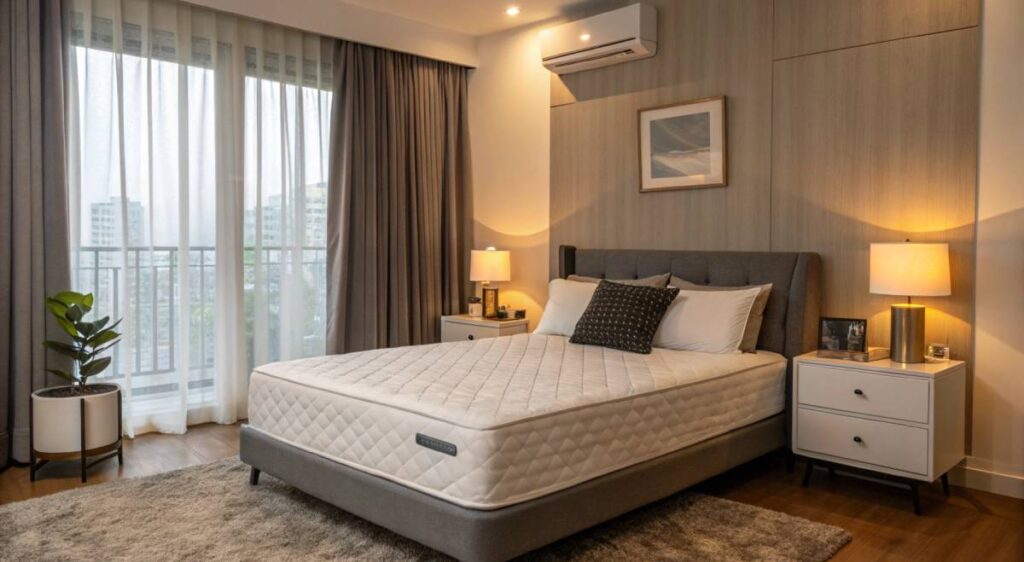
Creating a Sleep-Conducive Environment
Where you snooze is kinda a big deal. Get it right, and your sleep game will improve like magic.
Your bedroom is a sanctuary for your sleep; make it as peaceful as possible.”
Tips for a Sleep-Conducive Environment:
- Keep it Cool: A chill room tells your body it’s time to hit snooze.
- Silence the Noise: Block out the world’s racket with earplugs or a white noise machine.
- Block the Light: Blackout curtains or an eye mask can help you keep it dark when you need it.
- Comfortable Bedding: Sink into a comfy mattress and pillow. Your back will thank you (best mattress for sleep).
Ideal Room Conditions:
| Factor | Ideal Condition |
|---|---|
| Temperature | 60-67°F |
| Noise | Minimal |
| Light | Dark |
Want more info? Check out our sleep-friendly bedroom guide.
With these tweaks, you’ll be sleeping like a baby. Finding the right natural sleep solutions can help kick stress to the curb and boost your z’s.
Stress-Busting Tricks
Cutting down on stress can work wonders for your zzz’s. Getting into stress-busting habits like mindfulness, meditation, and good ol’ chill-out exercises can really help folks battling regular sleepless nights or stress-related tossing and turning.
Getting Zen with Mindfulness and Meditation
Mindfulness and meditation are like a calm-down button for the brain, making hitting the hay and staying there a whole lot simpler. It’s all about living in the now and not letting those pesky thoughts take over.
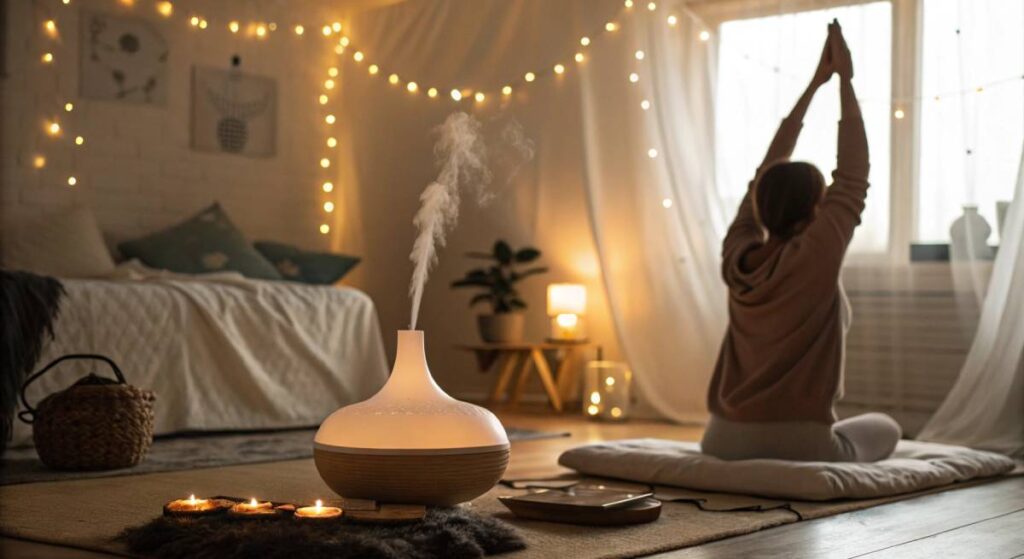
Mindfulness Moves:
- Body Scan: Zero in on each body part, starting at your toes and working your way up. It’s all about feeling each part relax, bit by bit.
- Breathing Workouts: Slow, deep breaths are your best buddy here. Count them out or just vibe with the feeling of breathing to keep stress at bay.
Meditation Ideas:
- Guided Zen: Pop on a meditation recording that walks you through chilling out steps.
- Silent Sitting: Get comfy and quiet, focusing on your breathing or a mantra. Try it for about 10-15 minutes each time.
If you’re curious about digging deeper into meditation, check out our feature on meditation for sleep.
Chill Out with Relaxation Moves
Relaxation techniques are just what the doctor ordered to shake off stress and prime your body for some serious shut-eye. Do them anytime, but they’re golden before bed.
Relaxation Goodies:
- Progressive Muscle Relaxation (PMR):
- Squeeze and release each muscle group, one by one, starting from the feet.
- Breathe Deep:
- Inhale deeply through your nose counting to four.
- Hold for four counts.
- Breathe out slowly through your mouth for four counts.
- Keep it going a few times.
- Imagine Peace:
- Picture a serene place or scene.
- Bring it to life with sights, sounds, and smells.
| Chill-Out Trick | Minutes Needed | How Often |
|---|---|---|
| Progressive Muscle Relaxation | 10-15 | Daily |
| Deep Breathing | 5-10 | Whenever needed |
| Visualization | 5-10 | Daily |
Making these stress-relief tricks a habit can seriously boost your sleep game. For more ways to nail a bedtime routine, see our piece on bedtime routine for adults.
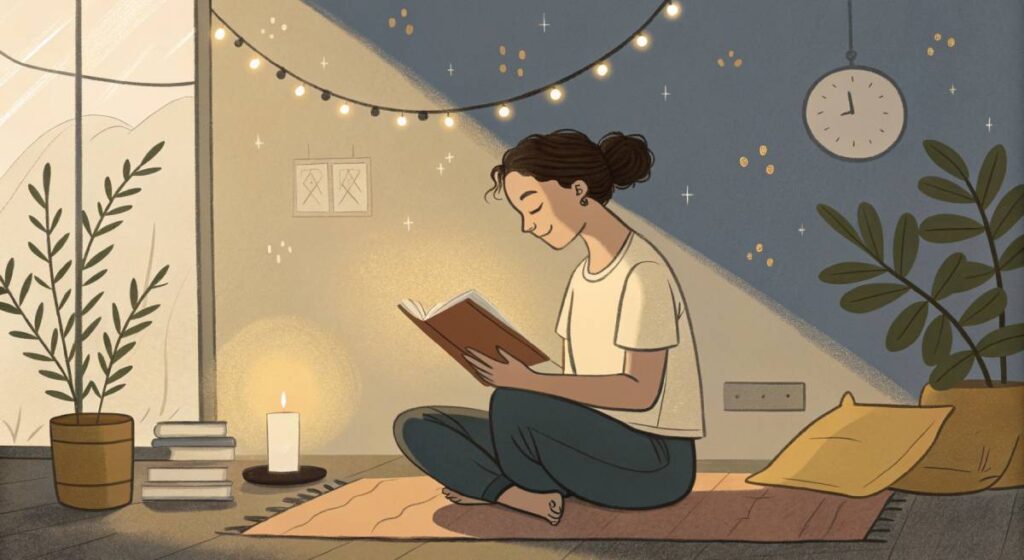
Natural Sleep Aids
Trying to catch some z’s without popping pills? Natural approaches might do the trick! Here, let’s gab about herbal remedies and aromatherapy, both champs at helping you snooze like a baby.
Herbal Remedies for Sleep
People have been reaching for herbal remedies to drift off for ages. They’re a down-to-earth pick next to pills, especially when stress is the culprit keeping you tossing and turning.
Check out these popular plant-based sleep buddies:
- Chamomile: Works like a charm for calming nerves and dialing down anxiety.
- Valerian Root: Good for beating insomnia and upping the quality of your sleep.
- Lavender: Chills out your nervous system, making way for deeper shut-eye.
- Passionflower: Eases anxiety and keeps your sleep cycle on track.
| Herbal Remedy | Benefits | Common Form |
|---|---|---|
| Chamomile | Soothes anxiety, relaxes mind | Tea, Capsules |
| Valerian Root | Tackles insomnia, boosts sleep quality | Extract, Capsules |
| Lavender | Calms nerves, supports deep sleep | Essential Oil, Tea |
| Passionflower | Quiets anxiety, stabilizes sleep cycle | Tea, Extract |
If natural sleep enhancers are your jam, check out our detailed piece on herbal teas for sleep to learn what’s what.
Aromatherapy for Better Sleep
Aromatherapy’s a sweet-smelling way to set the scene for sleep. With essential oils, you can wave hello to relaxation by diffusing, sniffing, or applying them directly.
Popular oils for snooze time include:
- Lavender Oil: The go-to for its super soothing vibes.
- Roman Chamomile: Helps shake off stress and chills you out.
- Cedarwood: Grounds you and nudges you toward dreamland.
- Bergamot: Lowers your heart rate and blood pressure, bringing on the calm.
| Essential Oil | Benefits | Application Method |
|---|---|---|
| Lavender Oil | Chill-out vibes | Diffuser, Pillow Spray |
| Roman Chamomile | Eases anxiety | Diffuser, Massage Oil |
| Cedarwood | Provides grounding | Diffuser, Topical |
| Bergamot | Calms heart rate, pressure | Diffuser, Bath Oil |
Use a diffuser in the bedroom for a peaceful vibe. Need more on turning your space into a sleep haven? Check out our guide on sleep-friendly bedroom.
Figuring out how herbs and aromas can work wonders on sleep opens the door to natural sleep aids. Keen on learning more? Dive headfirst into our resources on natural sleep solutions and how to fall asleep naturally.
Sleep Hygiene Practices
Sleep hygiene might sound fancy, but it boils down to making smart choices to help you catch those zzz’s every night. Sleeping well isn’t just some unicorn dream – it’s totally within reach if you tweak a few habits.
Maintaining a Consistent Sleep Schedule
Gettin’ your sleep groove on simply means hitting the sack and rising with the chickens at the same time daily. Weekends count too, my friend. This routine helps your internal clock tick-tock smoothly, curbing issues like tossing and turning in the night.
Why a steady sleep routine rocks your world:
- Sleep like a baby
- Hit the sheets fast
- Feel bright-eyed and bushy-tailed through the day
Got a wonky sleep clock? Read up on how to get it back on track.
| Schedule Part | On Point | All Over the Place |
|---|---|---|
| Bedtime | 10 PM every night | 10 PM on weekdays, 1 AM on weekends |
| Wake Time | 6 AM daily | 6 AM weekdays, 9 AM on weekends |
| Total Zzz’s | 8 hours solid | Uncertain, like 6 – 9 hours |
Limiting Exposure to Screens Before Bed
That glow from your phone or TV? Not your sleep’s best friend. Those screens zap melatonin, the sleepy-time hormone you need.
Here’s how to cut back screen time before bed:
- Say goodnight to gadgets at least an hour before you doze off
- Switch on that “night mode” to calm the blue rays
- Dive into a real book or get your zen on with some nighttime mindfulness.
What’s in it for you with less screen time?
- Let melatonin do its magic
- Slide into snooze easier
- Wake up ready to take on the day
Curious how a little digital clean-up can help? Check out how digital detoxing can change your sleep.
Start smacking down on these sleep tips and who knows? Your bed might become your happy place. Keeping a schedule and ditching screens can help make sleep as easy as falling off a log.
Seeking Professional Help
When those herbal teas and counting sheep don’t cut it, it might be time to chat with someone who knows their sleep stuff. Checking in with a sleep guru or a therapist could shine a light on what’s really going on with those restless nights.
Consulting a Sleep Specialist
These sleep experts dive deep into your nightly routine and figure out why you’re tossing and turning. Some come with fancy titles like neurologist or psychiatrist, while others might focus on breathing (fancy word: pulmonologist). But the big deal is—they know sleep inside out.
When you sit down with a sleep specialist, expect them to:
- Dig into your sleep story
- Hint at a possible sleep study
- Recommend tweaking daily habits
- Consider if you need some meds in your sleep toolkit
| Step | What’s Happening |
|---|---|
| Initial Chat | Discuss sleep habits, health history, and stress |
| Sleep Peek | Track sleep behaviors in a lab-like setting |
| Finding Out | Unearth sleep disorders or stress-related woes |
| Game Plan | Get tailored tips to catch better Z’s |
For folks wanting more natural tips, we’ve got some great reads on best natural sleep aids and setting up a sleep-friendly bedroom.
Therapy Options for Stress and Sleep Disorders
Getting to the bottom of stress and snooze troubles can be a bit like unraveling a mystery. Here’s where therapy steps in to lend a hand—or ear.
Cognitive Behavioral Therapy for Insomnia (CBT-I)
CBT-I is all about flipping the script on self-sabotaging sleep thoughts. If your mind’s a campfire of insomniac thoughts, this could be your blanket of comfort.
| Thing | How It Helps |
|---|---|
| Headspace Tweak | Overhauls downer thoughts about sleep |
| Do’s and Don’ts | Teaches bedtime rules and routines |
| Chill Techniques | Stretches and breathing for bedtime calm |
Mindfulness-Based Stress Reduction (MBSR)
Cue the calm with MBSR—where mindfulness meets chill vibes. It folds meditation and yoga into a cozy way to manage stress sleep troubles.
| Part | What’s Included |
|---|---|
| Mellow Focus | Keep attention here and now |
| Sleepy Yoga | Chill movements for nighttime comfort |
| Team Spirit | Share and learn with others |
For a dive into all things meditative and yogic for rest, swing by our guides on meditation for sleep and yoga poses for sleep.
Additional Therapy Options
Still hungry for more? Here are a few more ways to tackle stress and sleep:
- Biofeedback: Tune into body signals, like heartbeats, to chill out.
- Hypnotherapy: Get guided into a relaxed focus to untangle sleep issues.
- Interpersonal Therapy: Work through personal hang-ups affecting shut-eye.
All of these can be pieced together into a custom deep-sleep formula. Looking for more natural doze-off tricks? Check out natural sleep solutions and tips on how to fall asleep naturally.
Main Tips
- Incorporate Sleep-Boosting Foods: Add foods rich in tryptophan, magnesium, and melatonin to your evening meals and snacks to promote relaxation and better sleep.
- Avoid Stimulants Before Bed: Steer clear of caffeine, heavy meals, and sugary snacks at least 4-6 hours before bedtime to prevent sleep disruptions.
- Establish a Consistent Sleep Schedule: Go to bed and wake up at the same time every day to regulate your internal clock and enhance sleep quality.
- Create a Calming Bedtime Routine: Engage in relaxing activities such as light stretching, taking a warm bath, or reading a book to signal your body it’s time to wind down.
- Optimize Your Sleep Environment: Keep your bedroom cool, dark, and quiet to create an ideal setting for restful sleep.
- Pair Yoga with Other Sleep Hygiene Practices: Combine gentle yoga poses with other relaxation techniques like deep breathing or meditation to maximize sleep benefits.
- Manage Hydration Wisely: Stay hydrated throughout the day but reduce fluid intake in the evening to minimize nighttime awakenings.
Conclusion
Embracing these lifestyle changes can be transformative in your quest for better sleep and reduced anxiety. By incorporating sleep-boosting foods into your diet, establishing a consistent and relaxing bedtime routine, and optimizing your sleep environment, you create a foundation for restful nights. Additionally, pairing yoga with other sleep hygiene practices amplifies the benefits, leading to a holistic approach to sleep health. Remember, small adjustments can yield significant improvements over time. Stay patient and persistent as you implement these strategies, and you’ll soon experience the profound impact they can have on your sleep quality and overall well-being. Prioritize these changes today and embark on a journey toward peaceful, rejuvenating nights.
FAQs
What are the best foods to eat for better sleep?
Foods rich in tryptophan, magnesium, and melatonin such as turkey, almonds, cherries, and bananas are excellent choices to promote restful sleep.
How can establishing a bedtime routine improve my sleep?
A consistent bedtime routine signals your body that it’s time to wind down, helping to regulate your internal clock and reduce anxiety, which facilitates easier and more restful sleep.
What should I include in a relaxing bedtime routine?
Include activities such as light stretching or yoga, taking a warm bath, reading a book, and practicing deep breathing exercises to create a calming pre-sleep environment.
How does my sleep environment affect my sleep quality?
A sleep-conducive environment—cool, dark, and quiet—minimizes disturbances and promotes deeper, more restorative sleep.
Can lifestyle changes alone improve sleep without medication?
Yes, making targeted lifestyle adjustments can significantly enhance sleep quality and reduce anxiety for many individuals, often eliminating the need for sleep medications.
Resources
- National Sleep Foundation
- Harvard T.H. Chan School of Public Health – The Nutrition Source
- Mayo Clinic on Sleep Disorders
- American Nutrition Association
- Cleveland Clinic on Foods That Help You Sleep
Final Thoughts
Achieving quality sleep and managing sleep anxiety doesn’t have to be a daunting task. By implementing these essential lifestyle changes, you can create a harmonious balance that fosters restful nights and energized days. Incorporating sleep-boosting foods, establishing a consistent bedtime routine, and optimizing your sleep environment are foundational steps toward better sleep. Additionally, integrating yoga and other relaxation techniques can further enhance your ability to unwind and prepare your body and mind for sleep. Remember, the journey to improved sleep is personal and may require some experimentation to find what works best for you. Stay patient, remain consistent with your practices, and celebrate the small victories along the way. With dedication and the right strategies, you can transform your sleep experience, reduce anxiety, and enjoy the myriad benefits of a well-rested life. Start implementing these changes today and take the first step toward peaceful, rejuvenating nights.
Recommended Products
- Chamomile Herbal Tea by Traditional Medicinals
- Unwind with a soothing cup of organic chamomile tea, perfect for your nightly relaxation routine.
- Magnesium Supplement by Nature Made
- Support muscle relaxation and restful sleep with this high-quality magnesium supplement.
- Melatonin Gummies by Natrol
- Enhance your sleep cycle naturally with delicious melatonin gummies, ideal for evening use.
- Weighted Blanket by YnM
- Improve your sleep comfort and reduce anxiety with this cozy weighted blanket, ideal for relaxing after yoga.
- Guided Meditation App Subscription (Calm)
- Access a library of guided meditations tailored to improve sleep and support your relaxation practices with a Calm subscription.

